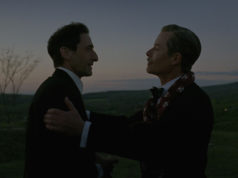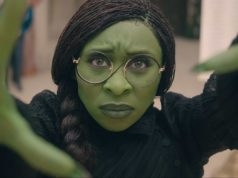
My fellow movie critics, both male and female, seem to be in step with me in finding Bridesmaids to be hilarious, but as usual with great movies, I had many more thoughts than would fit in my review of the movie. (I linked to Owen Gleiberman’s review in Entertainment Weekly at the top of this post. I take pride in my writing about actors, but he wrote about Kristen Wiig more incisively than I did. Damn, I hate when that happens.)
The common meme among the reviews is that the trailers are misleading and that the movie actually isn’t The Hangover with women in it. It’s true, the trailers for the movie, both the theatrical one and the unrated “red band” version online, have played up the slapstick and the gross humor. Universal Studios has packaged it to look like The Hangover with women, which is understandable given that Todd Phillips’ comedy was such a huge hit. Still, although the movies superficially resemble each other, this is a much deeper and more character driven piece. That’s hard to put across in a trailer, and even if you could, such films (whether they’re about men or women) tend not to pull in the same crowds. For my money, Bridesmaids is better than The Hangover.
Is this movie a social movement? Unlikely as it sounds, some people are treating it as such. The argument goes that if you don’t go to see this movie, skittish male-controlled Hollywood won’t make movies like this any more, and we’ll be stuck with the old crap that has passed for movies pitched at women. (I’d use the phrase “chick flick,” but I prefer to avoid the term.) I can see the point of that argument, and if guilt gets a few more people in the door, I’m okay with that because there’s no bad reason to see a great movie. Still, telling people that it’s their social responsibility to see any movie is a real buzzkill. It makes this movie sound like a cultural vegetable. I’m sure Kristen Wiig only set out to make a funny comedy, not become the figurehead of a movement. Then again, pressures like these often settle on people who never sought them out. It says something about our society, or at least our movie culture, that a film like this can be considered revolutionary.
One thing I like about this movie — and I can’t find anyone else mentioning this — is that there are three distinct roles for heavy women. One of them is played by Wiig’s co-writer Annie Mumolo, a friend of hers from L.A.’s Groundlings troupe. She portrays Annie’s seatmate on the plane who stokes her fears of flying. (“I had a dream last night that we went down. It was horrible. You were in it.”) Then Rebel Wilson, an Australian stand-up comic who here has a British accent and a shaggy peroxide wig, plays Annie’s eccentric roommate, who early in the movie gets a free tattoo that turns out to be gruesome in every single way. The best role, as I mentioned, is Melissa McCarthy as the groom’s sister Megan, who gives Annie a much-needed kick in the ass (and I mean that almost literally) when she’s at her lowest point. One of the great things about Megan is that says exactly what she means, and when Annie and Lillian mention growing up with the music of Wilson Phillips, Megan bursts out “I love Wilson Phillips!” without a trace of irony. It’s funny that such a tough lady has a weakness for the 1990s soft rock trio. This character could easily carry her own movie; if there’s a sequel, perhaps they might go that way. In a world where Seth Rogen and Jonah Hill are movie stars, it’s about time we got some heavy women to, uh, balance the scales.
I can’t believe I missed this comparison: Nicole Holofcener’s Friends With Money is also a comedy about friendship and class issues with a mostly female ensemble. It’s not the filmmaker’s strongest work, though, even if it has more stars than her other films. (More on her further down in this post.) Bridesmaids is a better comedy.
There haven’t been too many other notable movies cast mostly with women. I prefer not to think about the Sex and the City films or the recent remake of The Women. I mentioned The House Bunny in my review, which is about a former Playboy bunny who becomes a den mother to a sad-sack college sorority. It’s a bit too indulgent about the Playboy empire (it was made with the participation of Hugh Hefner, after all), but it’s still got funny stuff and great talent headlined by Anna Faris, who has carved out a career in comedy movies without the benefit of a stand-up career or a TV show. She still hasn’t become an A-list star, but her upcoming movie What’s Your Number? (which doesn’t seem to have a website yet) is generating a lot of early buzz and might change that. Then there’s Drew Barrymore’s Whip It, which features (hey presto!) Kristen Wiig in a prominent supporting role. It’s an honorable and modestly entertaining effort. Late summer will bring us The Help, another movie with a mostly female cast. I just finished reading the novel, and I’m interested to see how the film turns out.
If you want great movies about female friendship, you have to go back to the late 1990s. I’m thinking of Holofcener’s 1996 debut Walking and Talking, in which, like Bridesmaids, the main character has to deal with her best friend getting married. It’s remarkably insightful and well acted by Catherine Keener and Anne Heche, and if there’s one movie I’m mentioning in this post that’s almost as good as Bridesmaids, this is it. Romy and Michele’s High School Reunion came out the following year, and though it’s not a great film, it has some really funny bits, especially a three-way dance number that serves as a climax. (The choreographer was Adam Shankman, who’d later go on to direct Hairspray.) From that same year, Mike Leigh’s dramedy Career Girls stars Lynda Steadman and Katrin Cartlidge as two college friends re-connecting after almost 10 years apart. The chemistry between these two actresses is tremendous, and Cartlidge’s early death in 2002 still makes me sad. The only other recent film I can think of that addresses female friendship is Jennifer’s Body, which is a black comedy about two friends who discover that they don’t like each other any more.
I’m starting Kristen Wiig’s Oscar campaign right here, because 2011 is almost half over and I haven’t seen a better performance by a woman so far. The campaign is likely doomed because of the Academy’s bias against comedy and comedians, but I’m taking up the cause anyway because somebody has to, and because if this performance had been given by someone with more dramatic cred like Amy Adams (and it’s not hard to imagine her doing well with this role), there’d be more talk about this as a piece of great acting. You’ll probably hear more about this in December.












Great review. Totally agree with you. I think Rebel Wilson is the next Seth Rogen/Jonah Hill and about time a girl was afforded the same opportunities as them!